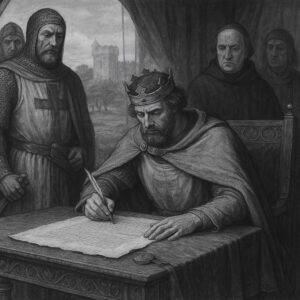Imagine England in 1215—a land ruled by a king with nearly unchecked power, where nobles and common folk alike faced heavy taxes, arbitrary justice, and the whims of royal authority. This was the reality for many people living under King John’s rule, but one group of brave individuals dared to challenge his authority, leading to the signing of the Magna Carta, a document that would echo through history as a cornerstone of democracy and the rule of law.
King John was not a popular monarch. His military failures, including losing vast territories in France, combined with harsh taxation and ruthless governance, angered many. He had been king since 1199, following the death of his brother Richard I (also known as Richard the Lionheart), who had gone to fight in the Third Crusade. John’s reign was marked by a series of costly wars, including the disastrous conflict against King Philip II of France, which led to the loss of Normandy and other territories.
King John’s domestic policies were equally unpopular. He imposed heavy taxes on his subjects, often without their consent or representation. This practice, known as “scutage,” allowed him to bypass Parliament and raise funds for his military campaigns through arbitrary means. The king also showed little regard for the rights of his nobles, often disregarding traditional laws and customs in favor of his own whims.
As tensions between King John and his subjects continued to rise, a group of powerful barons grew weary of the king’s abuses. Led by Stephen Langton, the Archbishop of Canterbury, and Robert Fitzwalter, one of the most influential nobles in England, the barons began to plot against their monarch. In 1214, they drew up a document known as the “Articles of the Barons,” which outlined their grievances against King John. They demanded that he agree to certain concessions, including the establishment of a new council to oversee the government and the limitation of his power to impose taxes without consent.
In June 1215, the barons gathered at Runnymede, a meadow in Surrey near Windsor Castle, where King John was forced to agree to their terms. This dramatic confrontation, which has become known as “the Battle of Runnymede,” resulted in the sealing of the Magna Carta (literally “Great Charter” in Latin). The original document consisted of 63 clauses, many of which dealt with feudal rights and property issues specific to the nobility.
However, several key provisions had far-reaching implications for English law and governance. For example, Clause 39 prohibited the king from imprisoning any freeman without a formal accusation and due process. Similarly, Clauses 40-42 guaranteed the right to a fair trial, including protection against unjust imprisonment and the right to appeal. Moreover, the document established the principle that even the king was not above the law.
Despite its significance, the Magna Carta was not without controversy. In fact, it was annulled by Pope Innocent III just a few months after being signed. King John’s supporters in the Church argued that the document undermined papal authority and challenged the divine right of kings. However, this setback did not deter the barons. They continued to promote the charter as a symbol of their resistance against an abusive monarch.
Over time, the principles enshrined in the Magna Carta endured, shaping English law and governance for centuries to come. Though it was initially a practical solution to a political crisis, the document planted seeds for the idea that no one, not even a king, is above the law. It introduced concepts such as due process, fair taxation, and the right to a lawful trial—ideas that would eventually shape modern democracy.
The influence of the Magna Carta can be seen in many subsequent documents, including the English Bill of Rights (1689), which established the principle that even the monarch was subject to the law. The American Founding Fathers also drew inspiration from the Magna Carta when drafting their own constitution. Furthermore, the Universal Declaration of Human Rights (1948) enshrines principles similar to those found in the Magna Carta.
What makes the Magna Carta truly remarkable is how it transformed the relationship between rulers and the ruled. It was one of the first times that power was questioned and accountability demanded—not just by nobles, but ultimately by all citizens. This shift laid the groundwork for representative government and civil liberties.
The legacy of the Magna Carta reminds us that democracy is not a gift handed down from above, but a hard-won right achieved through courage, resistance, and vision. Every time we hear about justice, fairness, or constitutional rights, we’re hearing echoes of that medieval document signed on a summer day over 800 years ago.
Even today, the Magna Carta is celebrated as a symbol of liberty and the ongoing struggle to balance authority with freedom. It’s a powerful reminder that laws exist not to serve the powerful but to protect the rights and dignity of every individual.
As we reflect on this remarkable document, we are reminded of the importance of standing up for our rights and demanding accountability from those in power. The Magna Carta serves as a beacon of hope for future generations, inspiring us to continue striving for justice, equality, and human rights.
The story of the Magna Carta is one of courage, resistance, and vision. From its origins in 13th-century England to its global impact on constitutional law, this document has become an icon of democracy and a testament to the enduring power of the human spirit.
As we commemorate this milestone in history, let us remember that the principles enshrined in the Magna Carta are not just relics of the past but continue to shape our world today. They remind us that, as citizens, we have a duty to stand up for our rights and demand accountability from those in power.
In a world where power can sometimes seem overwhelming, the Magna Carta stands as a powerful reminder that even the most seemingly insurmountable obstacles can be overcome through collective action and determination.

